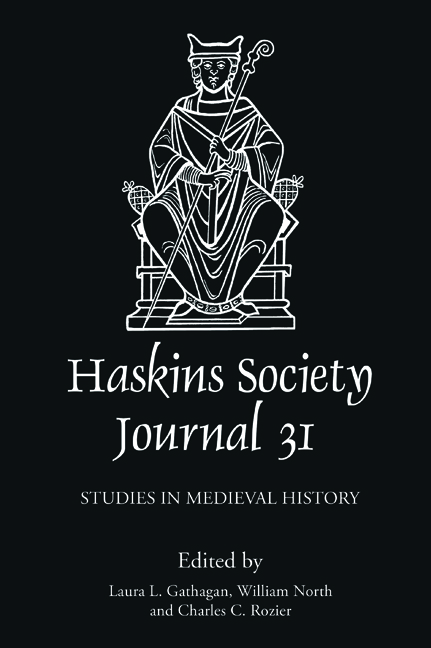Book contents
- Frontmatter
- Contents
- Figures and Tables
- Editors’ Note
- Abbreviations
- 1 Social Mobility and Manumissions in Early Medieval England
- 2 Flemish Settlements beyond Flanders: A Review and New Perspectives on Transregional Medieval Settlement Landscapes in Britain
- 3 The Road to Babylon: The First Crusade as Moral Performance
- 4 ‘Normans’ on the First Crusade: Actions and agendas of Two Crusaders: Robert Curthose and Bohemond of Taranto
- 5 The War Memoirs of Geoffroy of Villehardouin
- 6 Women in the Principality of Antioch: Power, Status, and Social Agency
- 7 The Story of the Veil: Matilda of Scotland, Controversy, and Imagination in Anglo-Norman Historiography
- 8 Political Identity and the Succession of Henry II
- 9 Competing Visions of the Past: Norman Identities in the Thirteenth-Century Chronique de Normandie
- 10 Rustics Petitioning to Parlement in the Thirteenth Century: A Case Study
10 - Rustics Petitioning to Parlement in the Thirteenth Century: A Case Study
Published online by Cambridge University Press: 15 December 2020
- Frontmatter
- Contents
- Figures and Tables
- Editors’ Note
- Abbreviations
- 1 Social Mobility and Manumissions in Early Medieval England
- 2 Flemish Settlements beyond Flanders: A Review and New Perspectives on Transregional Medieval Settlement Landscapes in Britain
- 3 The Road to Babylon: The First Crusade as Moral Performance
- 4 ‘Normans’ on the First Crusade: Actions and agendas of Two Crusaders: Robert Curthose and Bohemond of Taranto
- 5 The War Memoirs of Geoffroy of Villehardouin
- 6 Women in the Principality of Antioch: Power, Status, and Social Agency
- 7 The Story of the Veil: Matilda of Scotland, Controversy, and Imagination in Anglo-Norman Historiography
- 8 Political Identity and the Succession of Henry II
- 9 Competing Visions of the Past: Norman Identities in the Thirteenth-Century Chronique de Normandie
- 10 Rustics Petitioning to Parlement in the Thirteenth Century: A Case Study
Summary
Ordinarily, when speaking of judicial matters involving peasants, rustics or villagers (I shall use the terms interchangeably), medievalists think of them acting immediately in their own behalf, that is, without intermediaries, only in lesser civil matters or trespasses and torts, and then only in the lower courts. Minor disputes over land use, fulfilling labor and village tax obligations, violations of by-laws, tenancy, small debts, and slander were the sorts of matters that would come to these manor or estate courts in England and throughout continental Europe. Serfdom or villeinage might have a constraining effect on rustics’ capacity to seek legal venues for adjudicating or arbitrating these matters, but, unlike chattel slavery, medieval serfdom did not strip men and women of the entirety of their rights. True, rights might be asymmetrically distributed between male and female peasants, but the deprivation of the latter's capacity was relative, not absolute. However, beyond the village and manorial courts and the like (for example, stannary courts, and some forest courts), one would ordinarily expect peasants to have a voice in more prestigious courts only when they accused men and women of serious crimes or when they themselves were accused of such crimes. One certainly would not expect them to represent their villages in person in what were the ‘high courts’ of Europe in the High Middle Ages: Parliament in England, Parlement in France, the Jours of the county of Champagne, the corts and cortes of the Spanish kingdoms, or the German royal diet, to name a few. If we had good medieval records of certain Scandinavian lands, like Sweden, where the ‘national’ assembly of estates came to have direct peasant representation (regularized in the sixteenth century, but seemingly occasional before then), one might need to modify this opinion. Moreover, perhaps something even more startling might be revealed if good medieval records survived for the so-called peasant republic of Dithmarschen and nearby regions, like Drenthe, as early as the thirteenth century, but they do not.
The unevenness of evidence might render the existing picture somewhat problematic. Nevertheless, my overall impression, exceptions aside, is that villagers’ voices, insofar as they are sensed at all in the records of the High Court, emerge from the petitions that local scribes, remunerated by villagers, wrote in their behalf.
- Type
- Chapter
- Information
- The Haskins Society Journal 312019. Studies in Medieval History, pp. 205 - 219Publisher: Boydell & BrewerPrint publication year: 2020

